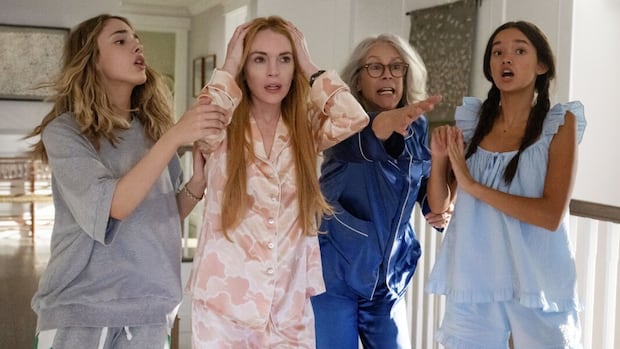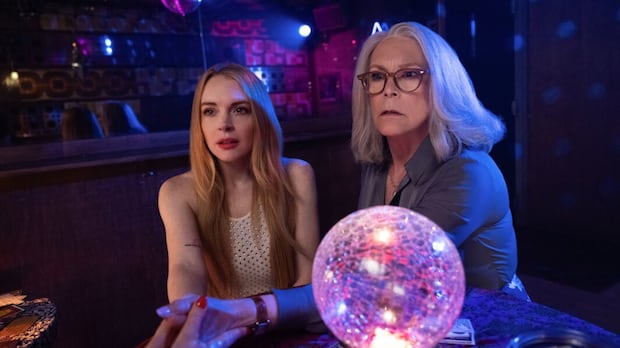Freakier Friday: From recession pop to recession movies, we are so back
Lindsay Lohan, Jamie Lee Curtis sequel revisits an early 2000s success

Forget Jet2holidays, Labubu or The Rizzler. The new internet fad is the recession.
Specifically, recession indicators. Sure there are the logical ones: the projected economic impacts of Trump's tariffs, jobs reports or production levels.
But more darkly enjoyable are the esoteric: the "vibe shift" indicators that — to those who enjoy gallows humour on social media — seemingly forecast a return to the late 2000s/early 2010s. The general observations can range from a Dunkin' Donuts closing in downtown Boston to "trash assemblage art" to, apparently, basically everything.
But most popular is pop culture — especially the bright, aggressively upbeat "recession pop" that ostensibly bloomed between 2005 and 2015 as a way to escape the nightmare and chaos of an imploding society. And if we're to believe USA Today, Time Magazine or CBC, recession pop is back, baby. We're terrified of the future, and only the comforting call of Ke$ha can soothe us.
With it, one could argue, enters Freakier Friday — even though the reboot of a reboot did not come directly from the recession years. The Lindsay Lohan- and Jamie Lee Curtis-led parent/child body-swap comedy is a sequel to the 2003 film Freaky Friday, which was a remake of the 1976 Jodie Foster flick that itself was inspired by the 1972 novel by Mary Rodgers.
But it does fall in step with a corollary filmic trend to recession pop in general — one that brought us the live-action remake of How To Train Your Dragon, the reboot of The Naked Gun and the billion-dollar behemoth that is Lilo & Stitch.
It's that appeal that made Superman's frank kindness and cartoonish red trunks a box office success and that brought Happy Gilmore 2 and even Clue back from the dead; the bright, possibly slightly undercooked nostalgia bait that exists not to think too deeply about but to give us what we're expecting, with a minimum of surprise — and even less insight.
And it's true, Freakier Friday does not reinvent the wheel. There is a bit of complication from the original premise: Where the 2003 film followed teen rocker Anna Coleman (Lohan) and her uptight psychiatrist mother Tess (Curtis) swapping bodies one freaky Friday, the sequel offers twice the fun.

Twenty years down the line, Anna is now a music manager and single parent, more concerned with the career and art of her star musician Ella (Canadian actor Maitreyi Ramakrishnan) than her own stalled rock star dreams. Meanwhile, Tess is a freewheeling author, offering gentle — and generally unwanted — co-parenting advice for Anna's surfing-obsessed daughter, Harper (Julia Butters).
Piled on top is Anna's sudden romance with fellow single parent Eric (Filipino-born Canadian actor Manny Jacinto), whose slightly stuck-up, beauty-obsessed daughter, Lily (Sophia Hammons), wants nothing more than to keep her family from blending with classmate Harper's.
As far as Harper's concerned, that feeling is mutual — a feeling that balloons out of control at a bachelorette party ahead of Anna and Eric's wedding. And unfortunately for everyone involved, it's at this party that first Anna and Tess, then Lily and Harper, bump into a "multi-hyphenate" life coach/knife seller/fortune teller.
And through the powers (inexplicably) vested in her, the switch happens once again: Anna swaps with Harper, Lily changes places with Tess, and everyone involved gets to learn a little bit about walking in someone else's shoes.
It's a formula for so obvious an end result, you could say it came from an Easy-Bake Oven. There are the slightly ham-fisted saccharine moments. There are the requisite smarmy tears. There's even a Mean Girls "October 3rd" reference.
And on the way, we do get a satisfyingly impressive return to comedic acting for Lohan — though the clownish star is, of course, once again Curtis (despite the fact that 90 per cent of her jokes are somewhat tastelessly ageist). At the same time, the chops necessary for everyone involved to even half-convincingly act as their co-star is nothing to scoff at.
From the eventual moral to the somehow always-too-bright lighting, Freakier Friday looks like it more than just took a page out of the Disney Channel Original Movies book. It is so simplistically satisfying and coyly canned, all that's missing are the "Disney knees."
But this is not necessarily a bad thing. There's a reason these movies have done so well — the same reason that recession pop has turned into a sort of pressure release valve for a society perpetually pelted with news about a dying planet, or coming civil or world wars.
In explaining the popularity of Superman — a simple and predictable character — philosopher Umberto Eco described the allure behind similar characters and stories as coming from a "hunger for redundancy." When the world is boring, predictable and easy to understand, he wrote, we seek out surprise and depth. But when the world is scary, confusing and unknowable, we crave something else.
"Narrative of a redundant nature would appear in this panorama as an indulgent invitation to repose, the only occasion of true relaxation offered to the consumer," he wrote in his essay The Myth of Superman.
That's because "redundant" art — music or movies where we know everything that will happen beforehand and are immensely satisfied when our expectations are met unchallenged — becomes irresistible when we're afraid. When Sherlock says "Elementary," when that reality show features terrible people screaming at one another or when the characters of Freakier Friday kiss and make up, a little dopamine bursts into our brain.
And, Eco wrote, there's no reason to feel guilty for that. "Is it not also natural that the cultured person ... should in moments of relaxation and escape (healthy and indispensable) tend toward triumphant infantile laziness and turn to the consumer product for pacification in an orgy of redundance?"
That would not be a bad description for Freakier Friday: a triumphant, comforting kind of laziness made with love.
Of course, a problem arises when this is the only type of art we consume. Or when studios intentionally shave all of the interesting edges off their films to appeal to the lowest common denominator, such as in the controversial updated ending of Lilo & Stitch, or Pixar's reported deletion of 2SLGBTQ+ themes from Adrian Molina's originally intensely personal Elio.
But here and there, a little recession pop escapism never hurts. And I ask, fellow millennials, who better to deliver it than Lindsay Lohan?




